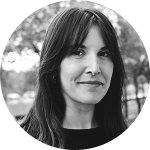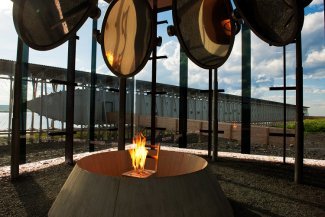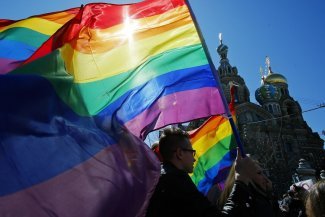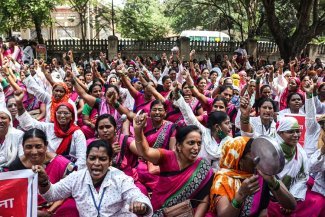In Yerevan, in March 2022, Taline is immersed in a feminist book, Cunt, by American writer Inga Muscio, published in 1998. “Books with feminist ideas and written by women are not generally available in public libraries in Armenia,” she says.
At the meeting point indicated the day before, the only establishments visible to passersby are two restaurants and a beauty salon. And for good reason: the place we are looking for is hidden. You enter Building 43/1 and go up a few floors. Arpi is waiting for you at the door to the apartment. You have reached the FemLibrary, the first feminist library in Yerevan, the capital of Armenia, a former Soviet republic located between Asia and Europe, inhabited by three million people. Here, thanks to a group of feminist and LGBTQ+ activists, hundreds of books written by women or about gender discrimination and gender equality are freely available.
In the main room, tables and sofas provide a place for anyone to sit and enjoy this literature at their leisure. Audre Lorde, Bell Hooks and Malala Yousafzai sit side by side on the brown shelves. The atmosphere is peaceful. The books are arranged by language: Russian, Armenian, English, German, French.
Thirty-three-year-old Taline [not her real name] is immersed in the pages of Cunt, a Declaration of Independence, a feminist book by American writer Inga Muscio, published in 1998. “I come here whenever I can. There aren’t many non-hostile spaces for women in Yerevan. This apartment is one of them,” she says. Next to her, a young German woman has just sat down, with a book in her hands.
While many bookshops in Europe have specialised in feminist literature, this library has already come a long way since 2016. “It was a simple idea that I had with my friend Anna,” says Arpi, who would rather not give her surname, one of the founders of the FemLibrary, as she stands on the balcony of the apartment looking over the snow-covered city of Yerevan. It is now a space that is open to all, and especially to those who are looking for sisterhood.
“Are you a sect?”
Back then, Anna was living and studying in Manchester, England, where she would regularly read books written by women who questioned patriarchal values. When travelling back to Armenia, she would sometimes slip a few of them into her luggage and share them. In her flat in Yerevan, Anna set up a sample of this library. She met Arpi, who dreamed of opening an art studio. “One day we sat down and put the whole concept of the library on paper,” says Arpi. The FemLibrary was born.
“Then we started looking for funding. All our requests were rejected. I think it was because we were too radical,” she says. The team had to move several times. “Everywhere we went, we were victims of homophobic or misogynistic violence and had to leave,” says Arpi.
In 2021, Armenia ranked 37th out of 39 countries in the Rainbow Europe, the LGBTQ+ rights index established by ILGA-Europe. Homosexuality has only been legal in the country since 2003.
Although the address is listed on their Instagram account, the place seems difficult to access for the uninitiated. For security reasons, it is only open two days a week. Mondays are reserved for women. When they moved in, the neighbours came to question them: “What are you doing here? Are you a sect?” they asked.
Those who come here are their friends, their “comrades, brothers and sisters in arms”, as they call them. Among them are many activists from intersectional movements and others interested in feminism. They come to read. Some want to play a more active role and help run the place. Around 15 people come here on a regular basis. There is no membership fee, but a donation box is available for anyone who wants to contribute a few drams, the currency of Armenia.
A safe space for LGBTQ+ activists in Yerevan
Next to the English translation of Simone de Beauvoir’s classic book, The Second Sex, is a poster with a female face. Coming out of her mouth are depictions of the reproaches and patriarchal discrimination suffered by women in relation to their looks, their weight, sexualisation or servility. Underneath are seven letters that sound like a call to action: PROTEST.
In 2018, Armenia was shaken by the protests that became known as the Velvet Revolution, which led Nikol Pashinyan, a former MP and journalist, to become prime minister. Women were particularly active. A few months after the events, Lara Aharonian, a feminist activist and founder of the Women’s Resource Center of Armenia (WRCA), said in an interview with France’s TV5 Monde:
“For the first time, women also spoke out in these mobilisations, as well as people from the LGBTQ+ community. Armenia is finally on the road to real democracy, because an oligarchic and corrupt regime has been brought to an end.”
Arpi and Anna also took part in one of the many demonstrations in Republic Square, one of the main plazas in Yerevan and home to the Government House. “Anna came and told me that we’d finally got funding. We thought it would never happen and we were absolutely thrilled,” says Arpi.
The two women were then able to rent their first premises: “A one-storey house surrounded by a lovely garden,” Arpi tells us, with a sparkle in her eyes. After a few months, however, the owner threw them out. “I think homophobia was the reason why we weren’t accepted. It was very brutal,” she says. After being evicted, the FemLibrary was reborn in a second location: a café open to LGBTQ+ people without discrimination. After a few renovations, many meetings and discussion evenings were held there. It became a landmark for LGBTQ+ activists in Yerevan, a place where feminist book clubs and art exhibitions were held and where activists would meet to make placards and posters for demonstrations.
A refuge for marginalised voices
In the open kitchen, Armenian tea and coffee are being prepared. As the kettle whistles, a voice emerges, speaking in perfect French. “Despite the demonstrations, we live in a very closed society. Women’s rights are not respected. Yet from what I remember, in the Soviet years, women were considered very strong and were well-respected,” says Taline, who explains that she studied French for several years.
The same view is echoed by Sona Baldrian, a researcher and head of the WRCA’s advocacy team. “During the Soviet era, Armenian women had more power. They held more important positions: we had more women doctors, for example. They were also more vociferous. Then they were pushed to stay in the private and family sphere. Men are always seen as the leaders, be it in the home or at the top of the state hierarchy,” she tells Equal Times. “Nikol Pashinyan’s government is not progressive. Only one out of 12 ministers is a woman.”
In Armenia, the gender inequality index is 0.220 (compared with 0.083 for France). The UN even raised concerns in 2022 about the legal exclusion of women, such as pregnant women, from certain occupations. “Everything we think stems from culture. Books with feminist ideas and written by women are not generally available in public libraries in Armenia. Nowadays, women are expected to keep quiet. And so, they are not respected. I really enjoy reading the works of Shushanik Kurghinyan and Zabel Yesayan. They represent a strong feminist heritage for Armenian literature,” Taline continues.
The FemLibrary is now nested opposite the office of the Human Rights Defender of Armenia. “We have been here for two years and, thank God, we’ve been able to stay here,” says Arpi. Is feminism too modern a stance in Armenia? “Some people are interested in it, of course. We have noticed that a lot of young people are getting much more involved now,” says Arpi. According to Taline, “a change of mindset is underway. The new generation of women have a better understanding of things than we did in the past. And this makes us stronger.”
Recently, Anna, Arpi and their community launched a crowdfunding campaign to raise money, to help them cope with the challenges ahead. More than just a library, they emphasise that the place they have created has become “a space for healing after the war [in Nagorno-Karabakh] and a refuge for marginalised voices in Armenia”.













